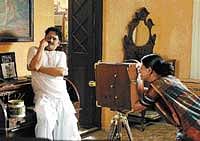Adding a pinch of humour

The light treatment to a serious subject has made it a favourite wherever it has been screened and already, Mokashi has won a spate of awards for the film. Excerpts from an interview:
When regional language films are released outside their own regions, they do not find much interest among movie-goers at large. Do you think the Oscar entry will help your film in this regard?
To some extent, of course, this glamour will take us to many other parts where these type of films do not go. Let’s see how it can attract non-Marathi people. We are very hopeful because whichever film festival it has been shown in, people have rated this film as any Marathi speaking person would do. Anyone who has watched the film wants to see the film dubbed into their language.
It was a theme that could have found an immediate wider market if made in Hindi, because the subject is such. Did that thought ever cross your mind?
No, I never thought of any language other than Marathi. The atmosphere of the backdrop that can be easily justified with Marathi references would have been difficult to translate into any other language. Also, another advantage of working in your mother tongue is that everybody is comfortable, and it reflects in the film. It helps people in other places to enjoy it easily too.
About the visual aspect, you have chosen to give an old-world look. Also, why the comic treatment?
We are very fond of emotional or serious treatment to such subjects. There have been lots of films which could have been made with a little bit of humour, but we choose ‘rona dhona’. That’s our basic bias against comedy and for seriousness, which is fine. But I am not like that. The basic reason for this treatment is that whatever details I could gather about how Phalke made this film, I never felt that Phalke or his family were getting serious over a particular incident. I felt that the spirit of the family was important. I wanted to handle it the way it was projected in his biography by Bapu Watwe. That prompted me to make the film the way it is, rather than because I wanted to make it in comedy rasa. I have not imposed my likings or dislikings.
What kind of research entailed making of the film?
Being a period film, we had to do a lot of research on costumes, buildings, the overall look. Art-designer Nitin Desai has already done a lot of films based on that period, so he had the experience. Pramod Purandare felt that sound also needed to be felt in the film. I must confess that I am not into making things very perfect. People may find many mistakes regarding period-detailing in my film, but I don’t give that much importance to those details because the spirit of the film is more important.
How much were you prevented from going into the detailing because of budget constraints, especially this being your debut film?
Fortunately, I was my own financier, so the constraint of having to convince someone else was not there. It is the costliest Marathi film ever made — we spent around four crore — but still, it is peanuts compared to Hindi films.
Why do you think it took so many years for somebody to make a film on Phalke?
I think a certain amount of time has to pass before a subject strikes you. It has to turn into nostalgia. Only after that do you start feeling for the subject.
How much of fiction is there in the film?
I maintained discipline of the biography. Everything is fact in the film, though I had to take creative, interpretative liberty where not much detail was available regarding some particular incident. For instance, the biography tells us about how difficult it was for Phalke to convince actors to shave their moustache, but exactly what had happened was a matter of interpretation as we had to turn them into scenes. Otherwise it will be just documentary filmmaking.